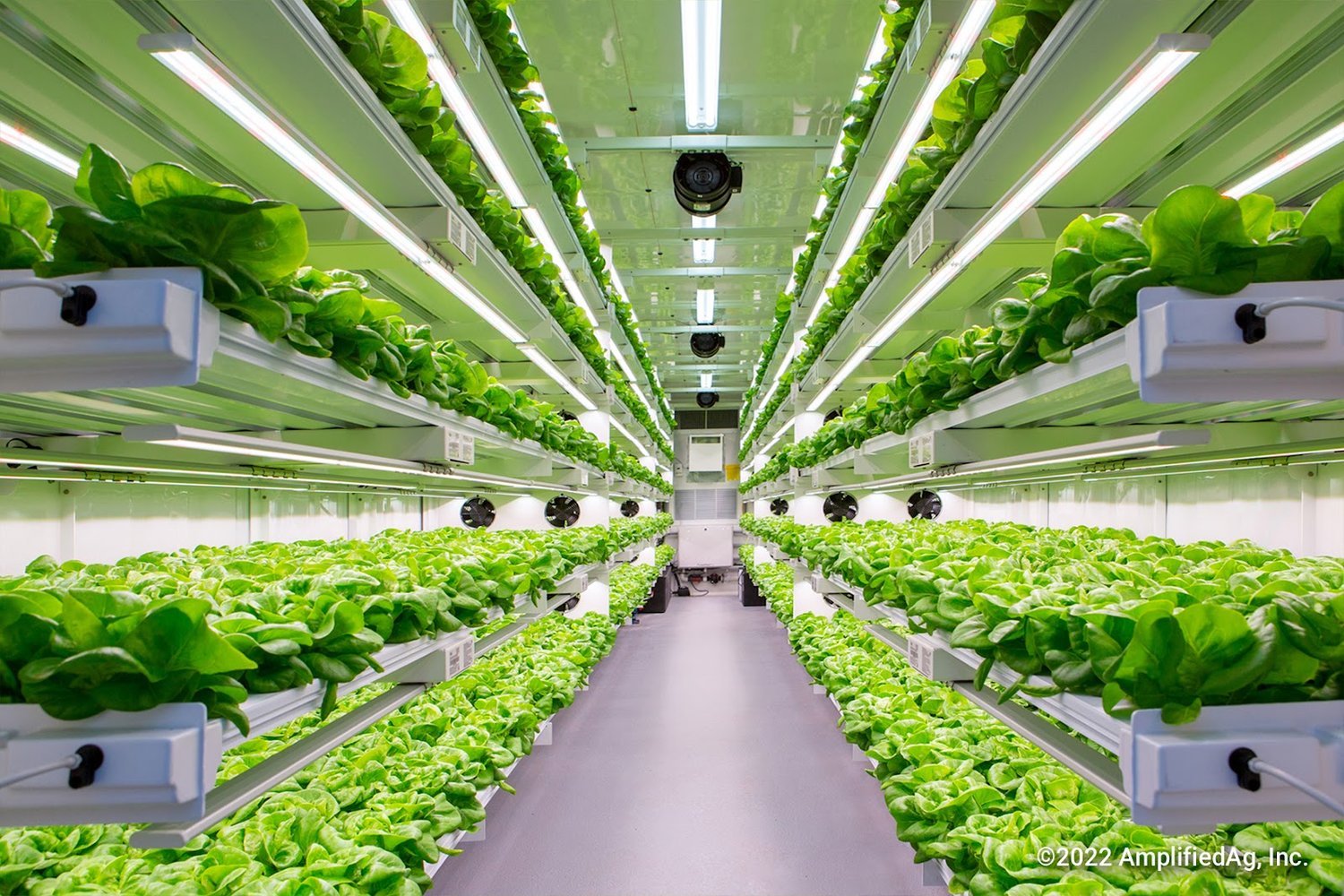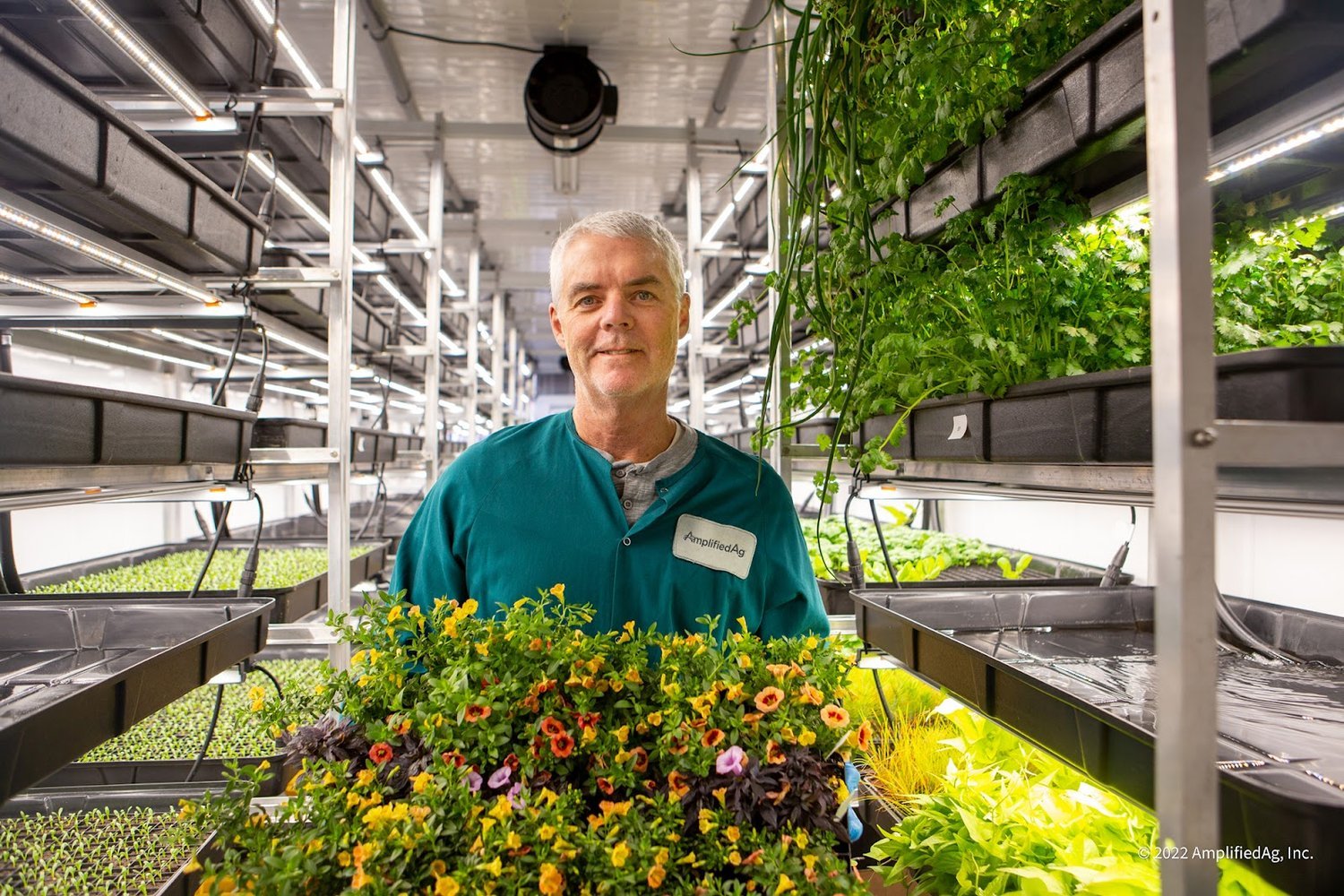Amplified AG Leaves Their Mark On The Sector: Scaling Container Farms With SaaS
Editor’s Note: Agritecture’s Founder and CEO, Henry Gordon-Smith, (HGS), spoke with Don Taylor, (DT), CEO of AmplifiedAg, about his experience in the CEA sector. This interview has been edited for clarity and brevity.
Transcribed and edited by: Sarah Jordan
February 28, 2023
HGS: Can you tell us about the founding story of AmplifiedAg? Specifically, how did you come up with the idea to begin the company? What problems are you trying to solve?
DT: I'm a software engineer by trade and have spent over 30 years developing cloud based platforms for health benefits, warehouse management, and widgets for other industries. Before founding AmplifiedAg, I spent the last 10 years or so of my career as the CTO of a SaaS company. I spent a lot of time in India and became very familiar with the agriculture crisis that was going on there as well as the larger global climate crisis.
In 2015, I started exploring different types of indoor farming, and it just clicked.
I understood the potential of indoor farming and the positive impact that it could have for our local food systems. From there, I spent probably a year researching various technologies and strategies for indoor ag, and I landed on the concept of using shipping containers.
AmplifiedAg CEO Don Taylor in an indoor farm growing butter lettuce.
We founded AmplifiedAg in 2016 and spent the first couple years building technology. We built a software platform, control system, and then a fully operating farm. From my experience of bringing new technologies to market, I knew we had to demonstrate the technology and also prove the concept working at scale. So, we decided to get into the retail space to prove the technology could effectively operate and grow produce to meet that type of demand and level of quality.
We’ve reached a point of optimization for the platform and the farms and have multiple years of at-scale farming expertise with our technology. Now, we’re focusing on enabling the next generation of vertical farming infrastructure for other operators.
HGS: I want to learn a little bit more about why you chose to farm in containers. Why are you choosing containers as your integration of choice?
DT: There is no other indoor farming environment that can be controlled to the degree of a container farm or be as easily deployable. Our mission is to modernize and localize agriculture by enabling farmers and communities. With that in mind, there needs to be a farming infrastructure that is easily accessible, flexible, and scalable, which is a big part of why we use shipping containers as our integration of choice.
We break the container farming process down into a couple of different segments. You start with propagation, and you go from propagation to grow to packaging. . There is also an exceptional level of security that individual containers can provide. For example, we can have 3600 plants in one container with 140 containers running. If we happen to get an infestation of Phytophthora or something similar, we can control it. With containers, we end up losing harvests from a couple of containers rather than the entire farm. Containers are also the fastest, most cost effective way to deliver as close as possible to the point of consumption.
HGS: There’s a lot of discussion that states that shipping containers have a lack of scalability. It sounds like to you that's a misconception, but there are challenges around the labor of having all these individual units. Is this a misconception? And if so, why?
DT: I do believe it is a misconception, and largely the result of container companies that put significant focus on small business and not enterprise scalability. In fact, containers might be the most scalable vertical farming method on the market.
At AmplifiedAg, we created a flexible format that can enable the scaling of an operation from a small business into an enterprise. Now, we are enabling research with institutions including the USDA and Clemson, bringing farms to food distributors, and assisting other CEA companies with additional capacity.
The container farming format is a long-lasting investment and allows you to scale at your own pace to achieve profitability instead of needing to build new structures or relocate your facility. And the optimized, modular growing environments provide the flexibility to expand crop diversity.
We've done a lot of analysis comparing our farming costs to traditional farms and greenhouses, and we are close in all categories. Because we can get so close to the point of consumption, transportation is not an issue, which offsets some of the other costs. And our engineering team is working on integrating food processing automation into the farm to decrease labor.
HGS: What is the largest farm you have constructed using the container methodology?
DT: Our largest container farm to date was constructed in Columbia, South Carolina with 140 total containers. This includes 8 for propagation which support 120 growing containers. We have 12 containers built into the spine, which is a refrigerated harvest and processing center built from shipping containers that runs down the center of suites of container farms. The farm operates on an average 23-day grow cycle and has the capacity to produce over 2.1 million pounds of leafy greens per year.
HGS: Does AmplifiedAg utilize a campus-like approach?
Amplified Ag CEO Don Taylor.
DT: We do use a campus-like approach, but we don’t have a singular design that we repeat. Every farm is unique based on the particular specifications and planned operations. One of the main benefits of our construction methodology is the modular and scalable design capability. This gives us amazing flexibility into how we design vertical farms to meet business, operational, site, and distribution considerations vs. a one-size fits all approach.
HGS: Since you have processing in addition to that, do you have other container modules that support the grow modules?
DT: Based on the requirements and design plan, each facility has its own configuration of modules that support production. We have propagation and growing modules in addition to processing containers. One propagation container can raise roughly 70,000 leafy green plants to be transplanted into about 18 grow containers. The spine also supports the grow modules to allow for harvesting and processing.
HGS: What about automation?
DT: The entire environmental control from propagation to harvest is automated. For our processing and packaging, we currently operate with a manual system. A lot of the cost is incurred to get the crop into the clamshell and ultimately out the door. Our engineering team is focused on ways to automate that process to reduce labor costs. As we continue to build farms for produce industry incumbents, we are able to design farms that integrate with their existing cold storage and processing.
HGS: You mentioned the competitiveness of AmplifiedAg relative to greenhouses, but the vertical farming sector is going through quite a few challenges this year (2022), and even this quarter (Q4) alone. We've heard about multiple companies having massive layoffs and difficulties. Most of the time they're citing energy prices, but other times are citing an inability to raise more money and achieve profitability. What's your take on this correction period in the vertical farming sector?
DT: If I start from a macro perspective, I’ve been in the software industry for almost 40 years. We've gone through probably five major technology cycles during this period. Every single cycle begins with a lot of entrance into the space, and a lot of capital will be raised. Then, there's a period of time where disillusionment occurs. The early adopters are not good references for the pragmatist. So, you're trying to move the technology to the pragmatic side. That takes time. It comes down to being very careful with your cash and being really myopic. Focus on where you spend your time and your energy. When you come out on the other side, you're going to have a handful of companies that were effective during that period, and they’ll be able to move into the mainstream. I think that’s when you will start to see significant growth in the CEA space.
HGS: Let's look to the future a little bit. What's coming next for AmplifiedAg? What direction do you see your business going in the future?
DT: We are focused on farming technology. When I initially got into this field, it was really about enabling farmers and creating a sustainable food supply. We're going back to that. The industry at large breaks down into a few different sectors, and we're selling and deploying technology to support the CEA infrastructure for farmers and other food suppliers.
Larger scale brands selling leafy greens in the United States are looking for alternative supply sources. We're never going to replace that source, but I think that we can certainly create channels to help augment that source. To me, that is putting farms right near these major processing facilities. You literally just move the raw material into their processing facility. Ultimately, selling and deploying technology is what we aim to do.
HGS: There are a couple of shipping container companies out there that have approached things in a similar way. I'm curious what differentiates you when people are looking for CEA technology?
DT: At AmplifiedAg, since we started as a software company, our platform is built with a decentralized architecture. We aim to be able to scale across multiple customers so our software platform takes you from seed to sale. I owned a warehouse management software company years ago. We used that as the foundation for the logistics, and then built a control system for our electronics. So, we own the software stack from top to bottom. It has given us an advantage to very quickly evolve the technology. Also, we have been operating large scale farms, and we know how to operate an enterprise production farm. We understand where the landmines are, all the way from food safety to getting the product out the door. We're able to provide consulting to our clients because we have experience with the product.
HGS: Is there anything else you would like to share about AmplifiedAg? Do you have any other perspectives that you can share with us?
DT: Ultimately, I'm very bullish on CEA. I think as an industry, we need to get more focused. I think as time goes on, we'll all start to fall into our niches inside of the supply chain and really become more collaborative. We need to be able to collaborate, but with any emerging technology, it takes a little while for it all to shake out.
Connect with Don Taylor on LinkedIn and learn more about AmplifiedAg container farms and technology at AmplifiedAg on LinkedIn and on our website.
About AmplifiedAg and Don Taylor:
AmplifiedAg is an agricultural technology company focused in the CEA category, and on a mission ‘to modernize and localize agriculture by enabling farmers and communities across the globe.’
The company was founded in 2016 by Don Taylor, a 30+ year software engineer. Since then, the company has developed a flexible, scalable platform of indoor farming technologies including vertical container farming systems for propagation, growing, and research, embedded environmental control systems, and farm management software. AmplifiedAg provides its platform of technology solutions to support food suppliers, urban, vertical and greenhouse farmers, and educational, research and government institutions. AmplifiedAg is proud to power the USDA-ARS CEA Center of Excellence, and also operates three production farm sites in the Southeast to support its Vertical Roots produce brand.
Learn more at www.amplifiedaginc.com.







